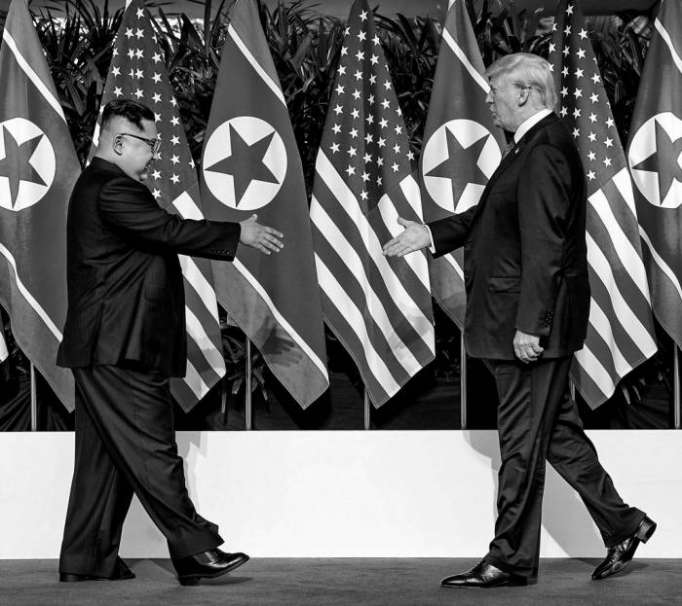Despite the many warts in President Trump’s unconventional diplomacy toward North Korea, we have to give him credit. Only five months ago, based on my conversations with this administration, I thought we were headed down an inexorable path toward a devastating war.
A military attack would not have ended North Korea’s nuclear weapons program. Instead, it would have resulted in a war — with hundreds of thousands of deaths in Japan and South Korea, including thousands of Americans — that the United States would have won but with horrible costs.
Thanks to the creative Olympics diplomacy from President Moon Jae-in of South Korea, which teased the North Koreans out of their self-imposed isolation, and Mr. Trump’s impulsive decision to meet with the North Korean leader, Kim Jong-un, the world witnessed a historic meeting on Tuesday between two countries that have been sworn enemies for almost seven decades.
Mr. Kim arrived early for the summit meeting as a sign of respect for his counterpart, who is more than twice his age. Mr. Trump played the role of the elder host, gently guiding Mr. Kim to the meeting room, showing him his limousine and reporting to the news media about the good-natured flavor of the meetings. Those personal touches in summit diplomacy can create unique opportunities for trust-building that a normal diplomatic démarche cannot.
To be sure, the joint statement that Mr. Trump and Mr. Kim released after their meeting left a lot to be desired. Mr. Kim did not commit to verifiable and irreversible dismantlement of North Korea’s nuclear programs. Mr. Trump gave props to a dictator who, according to the United Nations, belongs in a docket before the International Criminal Court for crimes against humanity. Mr. Trump surprised his South Korean ally by announcing that he would cancel joint United States-South Korea military exercises that help to keep the peace on the Korean Peninsula. The photo opportunity of a face-to-face meeting with the leader of the free world is the ultimate legitimizer for this nuclear rogue state.
Yet, in the case of North Korea, there are never good policy options — there are only choices between the bad and the worse.
Mr. Trump’s diplomacy, however unconventional, has pierced the isolation bubble of the North Korean leadership, which no previous president could do. The Singapore meetings will be remembered in North Korea’s domestic narrative as Mr. Kim’s coming-out party as the leader of the world’s newest nuclear-weapons-armed state. But the United States has set the agenda for next steps, with follow-up talks led by Secretary of State Mike Pompeo. And Mr. Trump has implicitly set the autumn as the first deadline for some deliverables with the promise of an invitation to the White House, presumably on the sidelines of the United Nations General Assembly in September.
Mr. Trump now needs to get North Korea to provide a full declaration of its nuclear weapons that will be verified by international inspectors. After verification, Mr. Kim must begin a process of dismantling and removing his weapons at a point in the future. The international community, despite its ambivalence to Mr. Trump, will have to support the American president in holding the North to these obligations.
Mr. Trump’s concessions will raise some eyebrows. What type of security assurances is the United States agreeing to? Will Mr. Trump eventually remove American forces from the Korean Peninsula in return for denuclearization? And why did the United States not insist on any human rights concessions as part of the deal?
But despite its many flaws, the Singapore summit represents the start of a diplomatic process that takes us away from the brink of war.
North Korea will not be testing any more missiles or nuclear bombs while the diplomacy continues, and the talks led by Mr. Pompeo will hopefully make progress toward stopping the world’s worst runaway nuclear program.
For Pyongyang, it may not have mattered who won the 2016 United States presidential election; North Korea would still have conducted many ballistic missile tests and a hydrogen bomb test. And a more conventional president might not have broken the mold by addressing the problem with a direct meeting with the Korean dictator. Mr. Trump’s unconventional approach leaves a lot to be desired in the foreign policy of the United States, but there was no other path to this less-than-satisfying but digestible outcome.
For the first time since 1953, the door has been opened to peace on the Korean Peninsula. It could close shut again in the near future — if North Korea’s past behavior is any indication. The Singapore summit meeting was a modest start. It’s just the beginning, but, as Koreans say, to have begun is half-done.
Victor Cha, a former National Security Council director for Asia, is a professor at Georgetown University and a senior adviser at the Center for Strategic and International Studies.
Read the original article on nytimes.com.
















































